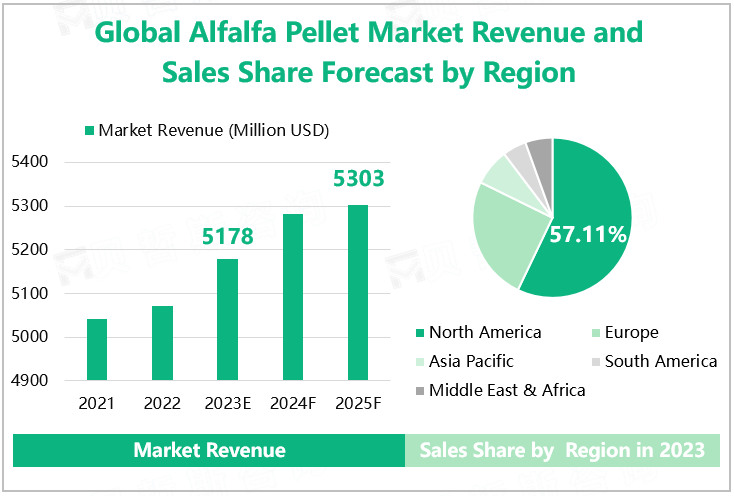Alfalfa pellets, rich in nutrients such as protein,
minerals, and vitamins, are a granular feed made from processed alfalfa grass and
have high nutritional value. They are widely used in animal husbandry.
Analysis of the GlobalAlfalfa PelletSegmentation Market
According to different production technology
standards and nutritional values, alfalfa pellets can be divided into two
categories: ordinary alfalfa pellets and organic alfalfa pellets. Among them,
ordinary alfalfa pellets are more widely used and occupy a dominant position in
the market. According to our research data, the global sales volume of ordinary
alfalfa pellets is expected to reach 16.77 million tons in 2023, accounting for
93.64% of the total sales volume.
From the perspective of downstream applications,
the application of alfalfa pellets mainly involves the feeding of herbivorous
animals such as cows, sheep, and horses, and occasionally is also used in the
feed of livestock and poultry such as pigs and chickens to provide rich protein
and minerals. Among them, the field of dairy cattle feeding is the largest
downstream application market for alfalfa pellets. The data shows that in 2023,
the estimated sales volume of alfalfa pellets in the field of dairy cattle
feeding is 11.55 million tons, accounting for an estimated 64.75% of the total sales
volume.
Global Alfalfa Pellets Sales Volume and Sales Volume Share Forecast by Type
and Application in 2023
|
|
Sales Volume (Million Tons)
|
Share
|
|
Segmented by Type
|
|
Ordinary Alfalfa Pellets
|
16.71
|
93.64%
|
|
Organic Alfalfa Pellets
|
1.13
|
6.36%
|
|
Segmented by Application
|
|
Dairy Cow Feeding
|
11.55
|
64.75%
|
|
Beef Cattle & Sheep Feeding
|
2.99
|
16.79%
|
|
Horse Feeding
|
1.97
|
11.02%
|
|
Others
|
1.33
|
7.44%
|
Source: www.globalmarketmonitor.com
Overview of Global Alfalfa Pellet Market Development and Analysis of Major Regional Markets
The global market for alfalfa pellets is showing a steady growth trend. Due to the impact of global climate change and reduced availability of agricultural land, the demand for alfalfa, as a cold-resistant, drought-resistant, adaptable, and easy-to-grow feed crop, is constantly increasing. According to our research data, the total global sales volume of alfalfa pellets is expected to reach 17.84 million tons in 2023, with an estimated total market revenue of $5178 million.
In the coming years, with the growth of the global middle-class population and the acceleration of urbanization, the demand for animal protein will continue to increase, which will further promote the development of the alfalfa pellet market. Meanwhile, with the continuous advancement of technology, the planting technology of alfalfa will be further improved, thereby increasing yield and quality, and meeting market demand. It is expected that the global market revenue for alfalfa pellets will increase to 5303 million by 2025.
From the development situation of various regions, the North American and European markets are relatively mature and demand is stable. Research shows that North America is the largest consumer market for the global alfalfa pellet industry, with an estimated sales volume of 10.36 million tons in 2023, accounting for 57.11% of the total global sales. In addition, the market for alfalfa pellets in the Asia-Pacific region is growing rapidly, mainly due to the large population, high demand, and rapid development of animal husbandry in the region.
Global Alfalfa Pellet Market Revenue and Sales Share Forecast by Region
Source: www.globalmarketmonitor.com
Analysis of the Development Trends of the Global Alfalfa Pellet Industry
Green environmental protection: With the increasing global environmental awareness, green environmental protection has become an important trend in the alfalfa pellet market. Planting alfalfa can reduce the use of fertilizers and pesticides, and reduce environmental pollution. Therefore, many countries are actively promoting alfalfa cultivation to achieve green development in agriculture.
Intelligent planting: With the advancement of technology, intelligent planting technology is gradually being applied to the planting of alfalfa. Through intelligent control, precise control of environmental factors such as temperature, humidity, and light can be achieved, improving the yield and quality of alfalfa. In the future, intelligent planting will become an important development direction for the alfalfa industry.
